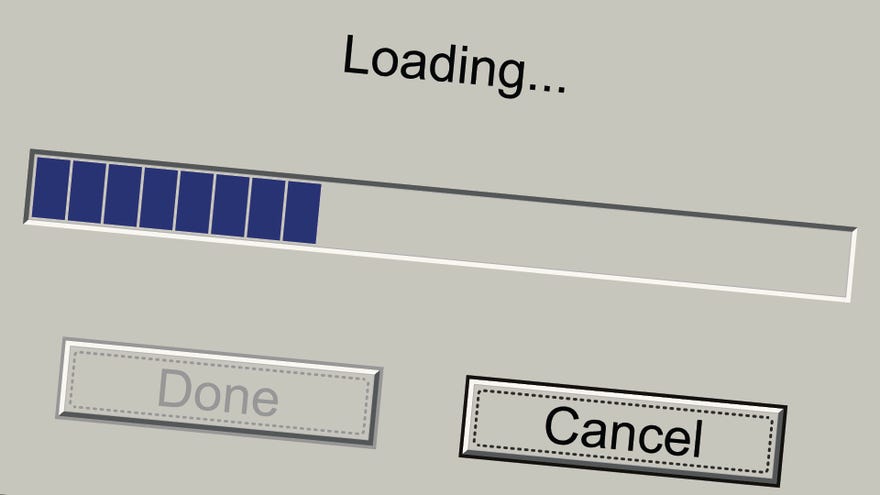Yes, video game loading bars are fake, indie devs admit
100% baloney
Indie game developers decided to shatter one of the worst-kept secrets in gaming this week, after admitting that loading bar progress is faked. But, they insist, you really wouldn’t have it any other way.
The bombshell came in the wake of a jokey tweet from comic Alasdair Beckett-King, who posited - tongue firmly in cheek - that devs should focus on perfecting a smooth-moving loading bar that accurately tracks the time left to load before they move onto other less important stuff like graphics and controls.
In response to Beckett-King’s gag, actual devs decided that now was the time to lift the curtain and reveal that, yes, loading bars have mostly been faked all long. (Thanks, GamesRadar.)
“I have never worked in a game that didn’t sport a fake loading bar. Real ones induce anxiety,” said Raúl Rubio Munárriz of Sexy Brutale and Song of Nunu: A League of Legends Story studio Tequila Works.
“Don't think I've ever coded a straight-up correct loading bar,” echoed former Vlambeer-er Rami Ismail, who recalled working on “projects where we faked loading bars, extended loading times, or artificially made loading bars move at uneven speeds”.
A common theme between the devs discussing why loading bars don’t move at a consistent crawl - we’ve all had loading bars that jump forward seemingly at random, or zoom to 99% before sitting there for an unfold amount of time - revealed that it isn’t because of the way games load (which loading bars don’t follow anyway), but because we as players simply wouldn’t believe them if they did.
“Fun thing: players don’t trust a smooth loading bar. The stutters and pauses show you that the load is ‘biting’. I’ve worked on games where we artificially faked it,” chimed in Thomas Was Alone and Subsurface Circular’s Mike Bithell.
Vladimir Bogdanić of Croatian studio Under the Stairs, maker of monochrome platformer Eyes in the Dark, said that the devs “literally added a loading screen and added a 5s pause because we wanted a nice transition even though the game loads the level instantly and it wasn't needed”.
With loading screens less prominent in the age of SSDs and digital-only downloads, you might think that maybe they’re a hangover from ye olden days of disc drives and slower hard drives that devs have preserved to keep us all bathed in comfortable nostalgia. Yet even those who were developing at the time admitted that loading screens still weren’t true to the slower loads.
“The loading bars in the Age of Empires random maps were me writing “now move to 20%” at what felt like appropriate lines of script,” wrote former Age of Empires and World of Warcraft dev Greg Street.
While an overwhelming number of devs responding to Beckett-King’s tweet admitted to faking loading bars to psychologically appease players, Lemmings creator and original Grand Theft Auto dev Mike Dailly took a bold stance in claiming that he had never fabricated a loading screen - not least because he’d been on the receiving end of a frustrating wait like the rest of us.
“I've never faked one,” Dailly declared. “In fact, I've gone out of my way to try and make it as "correct" and as smooth as possible...
“Probably because I've always hated the windows ones, where it'd sit for ages at like 20% then jump to 100%.”









